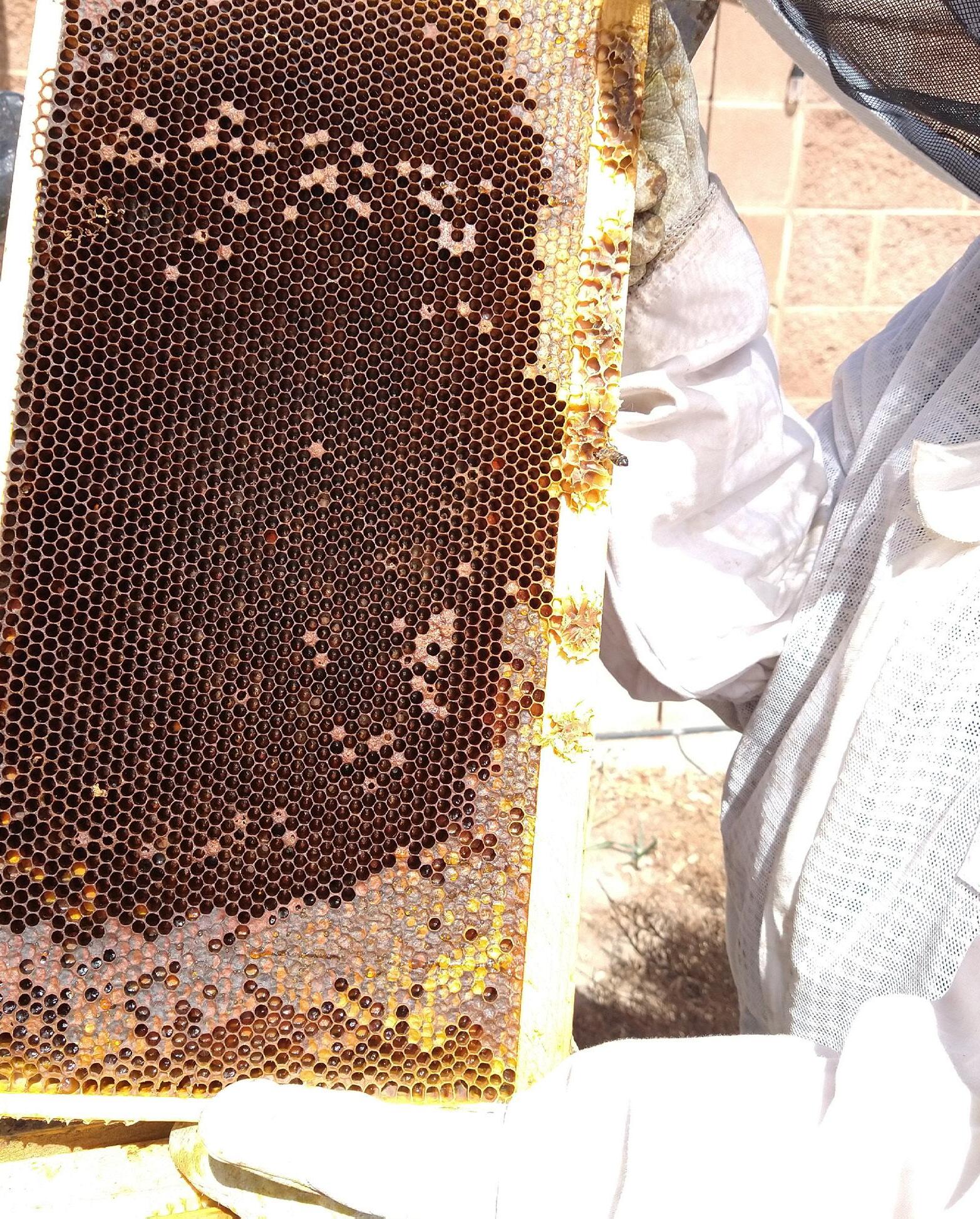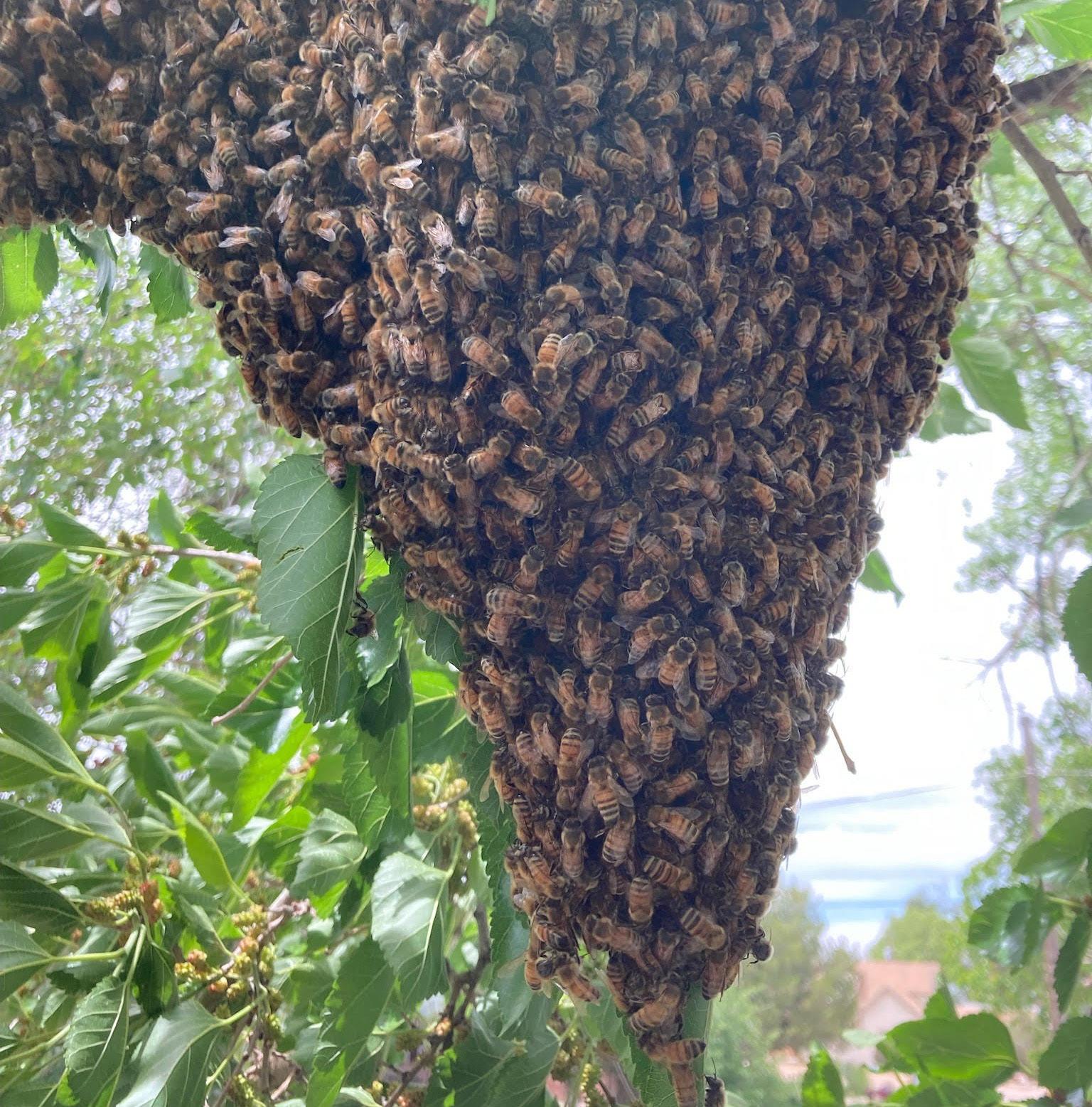
7 minute read
We speak for the bees
By Rory Harbert
The Pueblo County Beekeepers Association is going into its eighth year, and is one of the fastest growing clubs in the state, according to Dru Spinuzzi, the PCBA president who also serves as the advisor to the Colorado Beekeepers Association board. She has kept bees for 10 years now. She has two hives, the city’s limit, in her backyard and numerous others positioned on farms throughout the county. February and March are the most detrimental months in Colorado for bees with the weather unpredictable and winter food stores low compounded by pollen counts only just rising. This leaves bees susceptible for invasive pests and disease.
Advertisement
“We have to doctor our bees,” she said. “People think they can do it naturally or not doing anything at all, but you can’t do that. This is livestock and you have to take care them.”
The Pueblo Beekeepers Association offers two-day program, called the Bee Curious School, which costs about $80 to attend. Beekeeping requires a nuanced understanding of the many needs the colonies have to survive and thrive. According to Spinuzzi, the association has “one of the top-notch bee schools in Colorado” in providing clarity on beehive management.
“It goes through every single thing you need to know about beekeeping,” Spinuzzi said. “So from beginning to end, as far as what equipment you need, diseases, how to treat for mites, how to split, everything you need to know as a beginning beekeeper.”
For Spinuzzi, the club serves a critical role in sustainability.
“I think that our club really, really focuses on the mentorship, getting people involved, where you can get bees—you know, helping people out to be good beekeepers,” she said. “Because first of all, bees are not cheap. Equipment is not cheap. We don’t want somebody going down and just buying bees and letting them die. That’s not what we’re here for. We need to save the bees and they’re very essential. If we didn’t have bees… They provide pollination for 70% of our food. That’s a lot. So, if you take the bees out, then we’re in trouble.”
The Bee Curious! Speaker Event was coordinated by Spinuzzi who invited four keynote speakers who spoke on topics like the use of bees to pollinate almonds or mite treatment. Spinuzzi said she tries to choose speakers that can actually attest to raising bees in Colorado’s unpredictable environment. Spinuzzi said “we have to raise bees different because of our weather,” so every speaker was chosen because they had lived in Colorado at some point.
“That’s what we’re here for: to educate the public and new beekeepers to be sustainable,” she said.
This was the third year the event was held, excluding the interruption the pandemic caused. Spinuzzi said she hopes to have a honey expert speak next year.
The speaker event and vendor market help to raise funds for the scholarship PCBA offers for children and youth to start beekeeping and join the association. There have been at least four applications for the scholarship. According to Spinuzzi, “getting the word out has been challenging.”
Mentorship is a large part of what the association offers to beekeepers. Spinuzzi said that she has mentored, herself, 40-50 people over the past decade.
“I like mentoring kids because they listen,” Spinuzzi said, jokingly. “They do
local club recruits beekeepers of all ages, info on protocol for swarm season
what they’re told for the most part. Adults are a bit different!”
Beekeeping often is associated with those of retirement age, but two of the youngest beekeepers that have been in the club for a few years now, are in high school.
John Harbert (full disclosure: reporter’s brother), 17, has been beekeeping since 2021. He is taking classes in computer science, but has always had a strong interest in the environment. In addition to bees, he also has taken up keeping chickens.
“John is really smart, he does a lot of his own research,” Spinuzzi said.
Harbert explained how the bees seal themselves in their hives using propolis, a sticky compound the bees make from their saliva and wax to keep out intruders.
“One time… this beekeeper had hives and the volcano erupted and spewed like ashes and lava and rocks everywhere, and most of the hives actually survived because they sealed themselves inside with propolis,” he said.
For him, though he originally started beekeeping because of the environment, he is mainly motivated by how rewarding it is. According to Harbert, the environ- mental impact of beekeeping is more nuanced as it depends on the climate and its number of native bees to really determine the positive or negative effects of bringing in honey bees.
“It does encourage people to plant native flowers, and native flowers are good for both honeybees and native bees,” he said. “And if you’re in an area with quite a lot of native bees but not many honeybees, it’s probably better for the native bees... Native bees are actually much more efficient at pollinating plants than honeybees. However, they’re in such low amount most people who put honeybees on farms, only put honeybees because there are so few native bees.”
James Rothbaum, 15, started beekeeping around the same time. He said he has always been interested biology - specifically microscopy, which is the study of objects that cannot be seen with the naked eye. He has been taking engineering courses, though, so now he is torn between going into the fields of biology or computer science. Rothbaum has always had an interest in insects and the study of them. Though, he never expected to start beekeeping at any age. He said it was “completely out of pocket, to be honest, but I (do not) regret that decision.”
Spinuzzi is a family friend and Rothbaum was helping her out with some hives during the pandemic, when he was approached with the idea of beekeeping himself.
“I thought that would be a cool idea,” Rothbaum said. “And then, like, I knew a thing or two about insects, so... The next thing I know, I’m doing some research about it. We got some hives ordered, and thanks to her help, now we have two hives in our backyard.”
She speaks highly of Rothbaum as well, sharing a story about how she was shocked at how diligent he was at maintaining his hives.
“He texted me, ‘Dru, I did my mite count, I’m at 6%. What do you think I should do?’ I’m like what do you think you should do?” she said. Varroa mite counts are done by manually counting the number of mites found on a number of bees and then extrapolating out to a percentage overall. Different methods, from alcohol soaks to powdered sugar to extract mites from the bees for counting, can change accuracy. The mites are treatable, but can lead to total colony collapse.
Rothbaum said he was able to harvest and sell 30 eightounce jars of honey. He said he went into beekeeping with no specific intention in mind, but now he is more informed about the environmental impact bees and pollinators have.
“So, I just thought it would be cool and now I am interested in the environment,” he said. “I’ve learned a lot about, you know, bees dying off from pesticides, industrialization and stuff. So yeah, I have gotten interested in that.”
When Harbert and Rothbaum learned of the average beekeeping age being 55 years old, they were shocked.
“I thought there would be quite a lot of people who are young, who would be interested in beekeeping for the purpose of the environment,” Harbert said.
Rothbaum said that the average was “a lot higher than what I would have expected.”
Harbert said he does not personally know anyone his age that keeps bees, but he said “I’d relate to them more and they might have the same questions as me.” Though, starting a group outside the all-ages association is not necessary for Harbert, as he said the information would be the same “regardless of if you’re old or young.”
PCBA membership includes field days where they demonstrate how to do different tasks like performing a split, which is where you divide a group of bees that have become overpopulated and need to be separated and placed into an additional hive.

The group has at least 100 members, but this time of year is when memberships are up for renewal. Last year, according to Spinuzzi, the group had 165 members and she said they are likely to exceed that number.
Rothbaum said the mentorship program is beneficial for those interested in beekeeping.
“It’s not too difficult if you... have someone you can ask questions like I did,” he said. “Because Dru was kind of a mentor. If I had a question, she would know how to answer it. She’d even come over to my house, check out the hives, see what’s going on, see what I have to do.”
Vic Boley, of Boley’s Bee Haven, has been a beekeeper since he retired from his work at the sheriff’s office 10 years ago. His wife was a biology teacher who always did a section on honeybees for her D60 class, and after he completed the Colorado State University Extension’s “master gardener” program, he was inspired to get a hive for his garden. Now they have dozens of hives.


“Boy, time flies when you’re having fun, and beekeeping is fun!” Boley said. “I enjoy it.”
“My thought is: it’s better to have 1,000 beekeepers with one colony each spread across our communities with the pollinators and such, than just have one commercial beekeeper with 1,000 colonies,” Boley said. “It’s really a ‘give back to nature’ hobby.”
Boley is an active PCBA member who teaches at the Buell Children’s Museum, where he brings in “dead-outs” or hives that did not survive the winter to share how the hive works during the cold season. The “What’s the Buzz? The Life of the Honeybee” programs ends May 13.
The PCBA offers three tiers of memberships: individual, family and corporate. Memberships cost from $35-$80 and can be prorated if joining partway through the year. Membership includes affiliation with the group, voting privileges during officer and organizational elections, a free mentor for up to two years and spots on the swarm list to claim free bees reported to the swarm commander.
“You will see a big ball of bees, and they could be on a tree limb, they could be in a bush, they could be on the ground, they could be on the side of your vehicle,” Spinuzzi said.
Swarms, which are a collection of workers bees and a queen bee that are in search of a new place to start a hive, need to be reported to Spinuzzi, the swarm commander, at 719-250-3441, or the assistant swarm commander, Taylor Spinuzzi, at 719-664-9662. Callers need to be prepared to describe the swarm’s appearance and location.
The PCBA meets every third Thursday. The next meeting is 6:30 p.m. April 20 at the Lamb Branch Library, in the basement-level conference room. Virtual attendance is an option via a Zoom link on the group’s website at pueblocountybeekeepersassociation.com.











